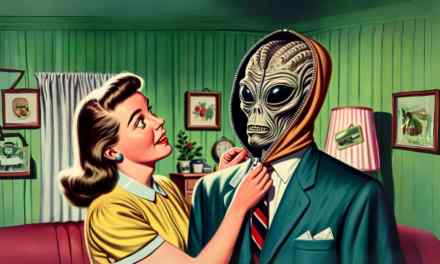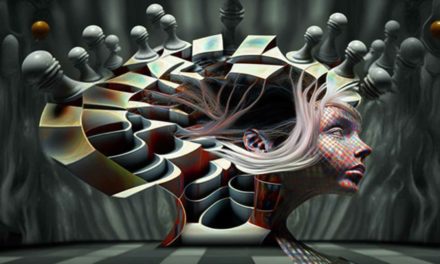Thomas Equinas hated to run.
But now he had no choice.
He had been entrusted with the future salvation of his kind.
An egg named Swee’pea.
And the Manticore was hot on Swee’pea’s trail.
Equinas contemplated the innocuous-looking egg resting now on his desk in its scrollworked mahogany cradle. A standard, stand-alone brood-pod, big as a baseline watermelon, the ivory-colored egg could have held any kind of embryo: mosaic or basal, cold-blooded or warm-blooded, vertebrate or invertebrate. No exterior sign pointed toward the unique destiny of the occupant.
A most hypothetical destiny, as yet. The embryo had first to survive to birth and live to adolescence.
About hating to run. This was both a philosophical and physical issue with Thomas. Both a figurative and literal disinclination. His pedigree included a large percentage of horse genes, and he had in the latter half of his life strived to minimize this part of his heritage. Running was part of what he abjured.
Of course, anyone seeing Thomas would have had little doubt as to his genetic composition. The large, liquid brown eyes, the stocky chest, the blunt horny feet and hands, his mane-like hair—all of these features betrayed the equine genes that consorted with the human, seal, raccoon and even avian codons in his cells.
As a young mosaic two decades ago, however, Thomas Equinas had loved to run. An unsophisticated healthy splice, employed on a vast African cell-phone plantation, Thomas had happily spent all his free time, after the day’s round of tending to the circuit shrubs, with the other bucks and fillies, in foot races and wrestling matches, afterwards nimbly climbing gnarly booze palms to pluck the liquor nuts from on high, returning to the ground for drunken orgies, awaking with throbbing head in the fragrant, breath-humid stables to start the cycle of mindless work and pleasure all over again.
But that had been before he learned to read.
One of the basal humans tangentially associated with the plantation had gifted—or perhaps cursed—Thomas with literacy. Her name had been Petrina, and she was a slim, blonde woman of indeterminate age who had come to the plantation to upgrade the circuit bushes one day. Her task took her a week, and during that time she was constantly out in the fields with the worker splices, sowing her upgrade viruses and checking the results of her work. During these times, Thomas had eyed her with a strange new mixture of curiosity, lust and interest. Petrina was unlike the humans who ran the plantation. She treated the splices with courtesy and genuine affection.
“Thomas, I need a random sample of antenna buds from at least six bushes separated by no more than seven meters but no less than four meters.”
“Yes, Peej Petrina, right away.”
“Just call me Petrina, please, Thomas.”
“Whatever you wish—Petrina.”
Somehow, without any intentionality on Thomas’s part, he miraculously found himself rutting with Petrina one night. He had seen her standing at the flickering edge of the circle of light cast by the big bonfire that accompanied the nightly diversions of the splices, and he had gone to her, abandoning his kind for the promise of the unknown—a path he had been following ever since.
Together Thomas and Petrina moved off further into the darkness and had sex. Afterwards, lying amidst the crushed lemon grasses, Thomas could not find it within his stunned self to initiate conversation. Luckily, Petrina had plenty of questions that would loosen Thomas’s tongue. She sought earnestly to learn the parameters and dimensions of his life, and eventually stumbled upon his illiteracy.
“Why, that’s scandalous! Back home, all our splices can read. It’s essential. That’s how they improve themselves and help us more efficiently. I don’t see why it’s not the same here…”
“Perhaps—perhaps it’s because there are so many of us here, and so few humans. You say that is not the case in your land…”
“No, not at all. In fact, even the old rough parity of one splice to one human has decreased lately, as new generations of kibes with higher turingosity become embedded in superior mycoflesh bodies. These aphylumic helpers seem destined to outmode your kind, by any number of performance criteria. Already, people are referring to a period known as the Redaction, a time when splices will go extinct.”
Thomas did not understand everything Petrina was telling him, but he sensed the imminence of some doom.
Thomas dared in this intimate moment to utter a rebellious thought. “I—I would like to read, I think. But our humans seem to want to deny us anything that would bring us closer to their level.”
Petrina sat up eagerly, her breasts swaying. In the darkness, her eyes seemed to catch the glint of the many Southern Hemisphere constellations overhead.
“Why, nothing could be easier, Thomas. I’ll get a sartor to fab up a dose of literacy trope tailored to your genotype when I go into town. You’ll be reading the next day, once all the glial rewiring subsides.”
“But how will you get access to my genotype?”
“Silly horse! I’ve already got one big sample of your cells. But you can give me another if you want.”
Thomas blushed at his stupidity, but was not so embarrassed that he failed to comply with Petrina’s suggestion.
Petrina went into town the next day, but did not return immediately. Thomas almost gave up hope that she would keep her promise. But when she did show up again, she carried the promised dose of neurotropins.
Passing over the smart pill on the sly, Petrina also whispered goodbye. Thomas was too excited even to realize he would never see her again.
Thomas swallowed the tropes when out of sight of his human overseers, washing it down after his shift with a swig of booze-palm juice. Almost immediately he began to feel light-headed and confused. He left his brawling peers for the stables, where he went immediately to sleep.
When he awoke in the morning, he felt fine. And the first thing he noticed was a sign on the wall of his crib.
CAUTION
MOSAICS UNPREDICTABLE
WHEN DRUNK
As the revelation that he was actually reading struck him fully, Thomas began to weep. As the deeper implications of the sign dawned on him—that he had been wasting his life as a brutish sot—he began to weep even more forcefully.
A human overseer came by to inquire politely, “Hey what the fuck is the problem here, you stupid ‘var?” Thomas pulled himself together, denied any ills, and went to work.
This was the start of his new life.
Thomas began to read omnivorously. He slyly rescued from the compost heap a cell-phone that had failed several quality-control tests but still functioned well enough for his purposes. He used it to surrepetitiously download texts from the ideocosm. With each book he consumed, Thomas felt his image of the world expanding and growing richer.
Thomas came particularly to relish philosophy, seeking the why of his world as well as the what. The ancient Greeks, the Germans, the twentieth-century masters like Bertrand Russell and Bob Dylan, the mid-twenty-first-century school of neo-Nozickians—all became as essential to Thomas as food.
And when he learned of the first historically recorded splice philosopher, an invidual named Modest Mouse, Thomas made up his mind to become one himself.
The path to this ambitious goal was not easy, and had taken many years of travail and suffering, years of heartbreak and setbacks overcome by perseverance and ingenuity.
Thomas and his fellows had been manumitted when the cellphone plantation went bankrupt, in the wake of the introduction of communicator earwigs into the marketplace. This gesture was not as altruistic as it sounded, amounting merely to turning loose helpless plantation mosaics into the restored primitive veldt where they had to contend with wild basal predators. Somehow, Thomas had managed to survive and make his way to the nearest big city, Jo’burg, where he found a job as a house servant for a conservative family that disdained the new mycoflesh servitors. There, Thomas was able to continue his education, eventually even surrepetitiously taking degree-level courses in the ideocosm.
After ten years, Thomas managed to compose and post several philosophical treatises in the ideocosm without revealing his true identity. They were accepted by the intellectual community. After a string of such successes, Thomas came out of the closet. A small media firestorm resulted among several granfalloons, which only had the effect of solidifying his new status. Grants and stipends followed, allowing him to abandon his lowly job. Since then, Thomas had become well established among both humans and splices, traveling around the world to speak and teach. He owned his own home now in the Republic of Snows, near Stockholm.
And it was here he sat now, contemplating the egg containing Swee’pea.
Thomas Equinas could pride himself on being a free, self-made splice, with several virtual books to his credit, respected by open-minded humans around the globe.
All because of a chance encounter with a generous woman.
The miracle of this was beyond any philosophy Thomas had yet managed to formulate.
But what good did all his personal success amount to, if his kind was doomed?
The predicted Redaction was well underway. Each year, fewer and fewer splices were being commercially bred, as soulless creations of ultra-pliable mycoflesh animated by aphylumic artificial intelligences came to occupy the societal niches that had been the domain of the splices for well over a century. It was a mass extinction on the order of that which had ended the Permian age. Well, okay, maybe that was stretching matters a little. But it was at least as big as the Cretaceous die-off.
Facing the end of his own inherently abbreviated natural lifespan, the elderly Thomas was more troubled by the decline of his race than by his own personal mortality.
Which explained why he had agreed to become Swee’peas’s guardian.
A month ago, Thomas’s servant—yes, he acknowledged the irony of employing splices in the same capacity in which he had once been employed—a badger-weasel mix named Gromo, had ushered into Thomas’s study an imposing mosaic. Tall, broad-shouldered, tawny- furred, muzzle packed with teeth, the splice had announced himself as Felix Navidad.
Studying the visitor’s half-familiar somatype, Thomas was shortly moved to ask, “Are you perchance any relation to the infamous Krazy Kat?”
“My great-grandfather,” rumbled Felix throatily.
“I hope you do not espouse his radical beliefs.”
“Not entirely. Warfare between the basal humans and we mosaics is both impractical and nihilistic. But I do believe in the preservation of our kind. Which is the mission that brings me here. A small, secret group of concerned cultivars has formulated a plan to insure that all the myriad splice genotypes survive any effort, however uncoordinated or gratuitously intentioned, to expunge them. We wish to enlist your help in carrying this scheme forward.”
“What can I possibly do?”
“All our hopes and dreams are to be embedded in a unique individual whom we call the Teleological Ark. This being will need a tutor and guide until he matures. We have chosen you, as one of the wisest among us. You must raise our heir to honor and protect his lineage. Teach him to carry our glory into futurity.”
Thomas pondered the breadth of this challenge. It required more energetic activity than he had been accustomed to in a long time. But what better use of his waning years could he ask for?
“I accept.”
Tension flowed out of Felix Navidad’s bunched muscles. “This decision relieves me. I had no wish to kill you to insure secrecy.”
Thomas smiled. “I appreciate both your honesty and forebearance.”
“But be warned,” continued Felix, “it is possible that you will face an antagonist far less charitable than I. A segment of humanity wishes to speed up the Redaction, claiming that an earthly paradise will occur only when our world hosts but a single species. You can imagine that the favored species is not a spliced one. They call themselves the New Adamists, and they have enlisted a formidable monster to hasten the day they await. He is called the Manticore. So far, we believe, the New Adamists have no inkling of our scheme. But if they learn, then they will surely send the Manticore after you and the Teleological Ark.”
“How can I possibly protect myself and the Ark from a professional killer?”
“When the Ark is a year old, he will have formidable abilities of his own. Till then, you must rely on your wits and subterfuge.”
Felix recounted to Thomas then the features sartorized into the Ark. Thomas mulled them over, marvelling at the ingenuity of splice-kind. The measures seemed adequate.
“I will have to leave my beloved home then?”
“So we advise. We are relying on you to find secure places to raise our prodigy.”
“When will the Telological Ark be given into my custody?”
“A month from now.”
“That is enough time for me to prepare a retreat.”
Felix held up a paw to forestall Thomas. “Tell me nothing. The fewer who know of your plans, the safer you will be. Goodbye, Thomas Equinas, and good luck.”
The Teleological Ark had arrived, cased in his brood-pod, some weeks later. By then, Thomas had made his plans. One of the the first things he had done was to rechristen the embryo in its incubator. No surrogate child of his was going to have to answer to so clumsy and determinative a name.
Thus, Swee’pea.
Now Thomas picked up the brood-pod from its cradle, holding it under one arm.
“Time to leave, Swee’pea.”
With Gromo carrying his few bags, Thomas made his way outside to his personal entomopter, parked on a broad lawn now summer-green. After stowing the luggage and the brood-pod onboard, Thomas turned to Gromo.
“I have established a trust to maintain this property for you and the other servants, Gromo, for as long as you live. Tend it well. Who knows, I might even return some day.”
“We will miss you, Varplus Equinas. Please take our best wishes with you.”
“Only the wordless support of splices everywhere gives me the strength to fulfill this mission, Gromo.”
Behind the controls of the dragonfly, Thomas prepared for ascent. The entomopter began to rise, scissoring its gauzy wings.
Emerging from the bordering forest a hundred meters across the lawn, a figure was bounding toward the arm-waving Gromo. Fearing the worst, dreading what he was about to witness, knowing he could offer no aid, Thomas poured more power into the wings.
Incredibly fast, the newcomer disclosed more and more of his identity the closer he got, until finally his unique nature was undeniable.
A pugnacious, snarling human head sprouted twisted oriental dragon horns from its brow. The brawny neck merged seamlessly into a powerful leonine body covered with sharp quills. A jointed scorpion’s tale writhed from the hindquarters.
The Manticore. Crafted in some dark sartorial crucible as a dedicated killing machine.
Some eight meters above the lawn, Thomas felt safe. Still, he jerked back in surprise when the Manticore made a startling leap and came within venom-spitting distance of the entomopter’s undercarriage.
Thumping unharmed to the ground, the fiend took out his frustration on hapless Gromo. Enfolding the servitor in a spiny embrace, the Manticore stabbed Gromo over and over with his barbed tail, issuing a defiant roar of frustration and challenge.
Weeping for the doom he had brought on his friend, Thomas flew off toward the south.
The Manticore managed to keep pace below the entomopter for nearly a kilometer, before falling behind.
Truly, Thomas was on the run now.
He just hoped Swee’pea was worth the sacrifice.
* * *
Scyphozoa City changed location continuously, but at a gentle pace.The bouyant undersea community consisted of some ten thousand colorful sartorized jellyfish, each as big as an aerostat hanger, supporting jungles of tentacles hundreds of meters long, submerged in the warm, nutrient-rich Pacific waters near the Phillipines. These living structures served as homes for some one million individuals.
The majority of the citizens were merpeople: basal humans modified somatically but not genomically to support an underwater existence. Thus they retained the legal genetic purity that conferred on them full enfranchisement, at the cost of some laborious postnatal kludges for each new generation. Allied with the mers were a variety of piscine splices. A smattering of short-term visitors from the airworld could always be found within city limits, accomodating themselves with various artificial devices.
Beneath the enormous pillowy cowls, those tissuey inverted saucers of the coelenterates, the daily routines of the city took place. Trading, eating, discussions, education, politicking, gossip—all the standard activities of sentient life. Meanwhile, the enormous jellies maintained themselves mindlessly, insensible to their internal parasites, stinging and capturing their prey with their nematocysts, and digesting their food gastrodermally, right alongside the oblivious merpeople.
Living in Scyphozoa City was like living under acres of billowing rainbow tents abstractly tethered with numinous cables. During the daylight hours, sunlight illuminated the translucent jellyfish from above, producing breathtaking stained-glass lighting effects that tinted the residents a thousand gemlike shades. By night, the internal bioluminescence of the living city produced a more fairy-like ambiance conducive to sleep, leisure and romance.
The last-named of these activities was what occupied the interests now of a handsome merboy named Swee’pea.
Although only four months old, Swee’pea was already as big as the average merchild of thirteen years. Physiologically an adolescent, Swee’pea was less mature mentally. But even lacking many realtime years of experience, Swee’pea possessed a sharp, probing intelligence and common sense—traits engineered into him to aid his survival.
Generally happy and easy-going in his daily dealings with his fellow citizens of the submarine city, Swee’pea found his limited world a delightful place.
Of course, the instructions and advice and affection tendered to him by his dear Uncle Thomas had invaluably supplemented his congenital wit and appreciation of life. Uncle Thomas’s tutoring on matters philosophical and practical had engendered in Swee’pea an openness and curiosity about life.
But Uncle Thomas had never yet tutored him in the ways of love. And Swee’pea, urged on by deep, newly ascendant longings, was intent on learning.
Dropping down through the twilit waters below the lowest ends of the dangling tentacles, leaving the safety of Scyphozoa City above and behind for his illicit assignation, Swee’pea sent out sonar clicks to alert Snagtail of his coming. Arrowing through the water with efficient strokes and kicks of his webbed limbs, Swee’pea was soon rewarded with an answer from his potential lover.
The boy could picture Snagtail vividly. A sleek basal dolphinoid body with a corona of lively ultra-sensitive and capable squid arms around the midsection, Snagtail sported a signature notch in his back flipper.
Swee’pea had grown up side by side with the splice, and considered the male his best friend. But lately, that friendship had begun to blossom into something else. Something not generally sanctioned between humans and splices in this community.
And as far as Swee’pea knew at this moment, he was fully as human as the other mers.
From below Snagtail rushed up, a darker blackness among the dusk, as if to ram into Swee’pea, turning aside only at the last second, and coming to a stop beside the boy.
The two communicated in their common language of clicks and whistles, less information-dense than the hyperflexive sign-language employed between humans underwater.
Missed you, said Snagtail.
Missed you too, replied Swee’pea.
Want you. Want you now. No more waiting.
But how?
Don’t know. Just try.
With some trepidation, Swee’pea allowed himself to drift closer to Snagtail, and soon found himself wrapped in a tentacular embrace, his dorsal side pressed into Snagtail’s ventral side.
And that’s when the change commenced.
Never before had such a thing happened in Swee’pea’s short life.
Great waves of peristalsis traversed Swee’pea’s body. Internal organs shifted, exterior forms flowed into new configurations. Cradled in the many arms of his friend and lover-to-be, Swee’pea found himself morphing in protean fashion, until at last he resembled his partner down to the signature defective fluke.
And resonating in response to some hormonal wavefront from Snagtail, Swee’pea had assumed the female gender.
Swee’pea could feel Snagtail’s penis probing for a home. Wrapping her own squid arms around Snagtail, Swee’pea accomodated his thrusting.
Beneath Scyphozoa City hanging like a vast gaudy chandelier above them, the two dolphin splices made love.
After they had finished, they separated, drifting in post-coital bliss.
After some time, Snagtail squeaked.
So nice! Do it again!
Swee’pea was not quite so enthusiastic. Although she had enjoyed the experience perhaps fully as much as her partner, she was confounded by the easy and speedy alteration of her morphology. Such a thing had never happened to her before—nor to anyone else in her ken. And beyond any explanation of how she had changed hung a more vital question: would she be able to change back to the only other form she had ever known?
There was only one recourse when faced with such a quandry. The same strategy Swee’pea had always employed when in doubt.
Go talk to Uncle Thomas.
Snagtail was bumping his snout playfully against Swee’pea’s midsection. She flicked him away with her tentacles and messaged, No more. Not now. Must talk with Uncle Thomas.
Skipping out on any attempt to cajole her otherwise, Swee’pea rocketed off toward Uncle Thomas’s home.
Coming upon a pod of merpeople, many of whom she recognized, Swee’pea instinctively used her tentacles to message hello. But not only did her new limbs fail to accurately mimic the greeting mudra, but the humans completely ignored the anonymous splice in their midst.
Feeling lost and alone, Swee’pea hastened toward the one being who might be able to help her.
Uncle Thomas resided in a living purse that clung remora-like to the outer cowl of one enormous jellyfish. The purse had been biofabbed from several different sea creatures—anemones and sea cucumbers among them. Its walls extracted oxygen from the sea and scavenged carbon dioxide from the interior. Homeostatic mechanisms spliced from hot-blooded animals insured that a livable temperature was maintained for its inhabitant.
Uncle Thomas refused to modify himself for submarine living. He claimed he was too old and set in his ways to make such a stressful adaptation. Consequently, he spent every hour of every day immured in his protective purse. He occupied himself with reading and viewing material downloaded from the ideocosm.
And with raising his protégé, Swee’pea.
Uncle Thomas had taught an intellectualy voracious Swee’pea everything the child knew. But the wise old horse had dangled in front of Swee’pea the promise of much more knowledge to come, when circumstances demanded or permitted dissemination.
Swee’pea hoped that now would qualify as such a time. If not now, when?
At this late hour, Uncle Thomas’s home was dark. A school of basal angelfish were nibbling at some of the purse’s exiguous fronds. The fish darted away as Swee’pea arrived. She tickled the purse’s wake-up node and waited.
A pearly light swelled inside the translucent sac. Uncle Thomas was bestirring himself. In a moment, his familiar blocky face appeared at a transparent oval in the mottled wall. Below the window, a set of rubbery green lips formed themselves out of the smartskin, preparatory to issuing dolphin-speak. Uncle Thomas’s blunt fingers could not manage the hyperflexure mudras.
Who are you? Uncle Thomas asked. What do you want?
It’s me, Uncle! Swee’pea!
Uncle Thomas did not seem surprised.
Your first change has overtaken you then, my boy. Congratulations! You are coming into your own.
Why? How?
Your body is unique. Your cells are infinitely plastic. And you contain within you a library of forms. The genomes of all the mosaics ever spliced. You can recreate them at will. And other shapes as well.
Then I can go back to what I was?
I believe so…
Teach me how!
I can’t. You’ll have to find that knowledge inside yourself somehow.
Uncle Thomas continued to look out the window with earnest sympathy, but offered no further words of encouragement or advice.
For the first time in his life, Swee’pea grew angry with his mentor. He tried to scowl, but his cetacean face was unsuited for the expression. So he whipped around, flicking his tail disrespectfully in Uncle Thomas’s face, and flashed away.
For half the night, hiding among the lower tentacles of Scyphozoa City, Swee’pea strained to re-express her old merperson somatype, to no avail. She grew more and more frustrated and angry, emotions which only seemed to interfere with whatever mental discipline might be needed to trigger the transformation.
Swee’pea began to blame her current plight on Uncle Thomas and his insistence on living in out-of-the-way Scyphozoa City. Why couldn’t they live in a modern megalopolis like Neo Seattle or Punta Arenas? Swee’pea had heard many alluring tales of these cities. Surely such hotbeds of civilization would have experts who could help an individual in such a fix? But no, they had to live in a literal backwater like Scyphozoa City? And why?
Uncle Thomas would always reply to such a question with the same answer:
You and I have enemies, child. Enemies who force us to inhabit harsh oases where we can remain unknown.
Enemies… Swee’pea would like to meet one of these imaginary foes…
Filled with self-pity, Swee’pea malingered among the writhing, predatory tentacles almost till dawn before a chance meeting solved her problem.
Two merteens dropped slowly down through the waters, tangled in a lusty embrace. Kissing, petting, the boy and girl were oblivious to Swee’pea’s presence.
Watching as the pair moved more deeply into their loving, Swee’pea felt his old male hormones surging, imagining himself in the role of the merboy.
Cells flowed and reconfigured. This time, Swee’pea was able to discern and annotate the processes by which his body morphed. Moreover, the set of procedures could apparently be catalogued and invoked as a routine.
Within minutes, he happily inhabited again the amphibious male body he had known for the whole four months of his life.
But now he knew he could change with the proper stimulation.
And sex seemed to be the trigger.
No longer irked at his uncle, Swee’pea swam back to Thomas’s purse.
The interior illumination still leaked from the window around Uncle Thomas’s vigilant face, and Swee’pea realized that his uncle had indeed been worried about him, but determined not to show it, for one reason or another.
Thomas’s words confirmed this.
Child! You’ve mastered the trick!
Yes! Now I can become anything.
And you must. To learn the true meaning of the lives of splices. Assimilating the precious mundane heritage of our kind is to be your education, before we go extinct. That is why your other name is the Teleological Ark.
The Teleological Ark. Suddenly Swee’pea felt a new importance suffusing him, a kind of racial manifest destiny.
For the next several weeks, Swee’pea experienced scores of different bodies, mimicking all the aquatic splices who lived in Scyphozoa City, as well as any visiting drylanders. So far, sexual desire seemed necessary to launch each change, resulting in frequent couplings—hardly a drawback to his unique course of study. But after a dozen or so encounters of this type, Swee’pea began to imagine a day when he would be able to initiate a change at will, without the trigger of lust.
Swee’pea’s activities, however, brought inevitable notice to the youth and his uncle. A protean splice was unheard of, and visitors to the city invariably carried away news of Swee’pea’s indiscreet exploits.
One morning Swee’pea and Uncle Thomas were conducting a lesson.
This merperson form is not my true form then, in any sense…? Swee’pea asked.
Not at all, replied Thomas. I chose it for you via an exterior somatic prompt once I knew this was the place where you would emerge from your egg.
It feels like the real me. Swee’pea paused thoughtfully. But then so has everything else!
Good. You should be at home in any shape—
A fleeting shadow was all that saved Swee’pea from being brutally smashed by a huge object bulleting down from above. As the flicker of shade occluded his sight, a lifetime of underwater play-reflexes caused him to dart out of the line of the attacker.
Turning around to see what had overshot him, Swee’pea confronted a monster: human, lion, scorpion, dragon. In the human mouth of the ghastly creature was a rebreather device. A water-jet backpack aided the ungainly but powerful body in its assault.
The lips on Uncle Thomas’s purse shrilled out, This is the Manticore! He wants only your death! Flee!
Enemies. Perhaps not as imaginary as he had thought.
Diving downward, Swee’pea accelerated with all his sinuous strength.
Close behind, the Manticore used his artificial propulsion device awkwardly, but with undeniable results.
He would overtake Swee’pea soon.
Unless Swee’pea could find someone or something to halt the killer.
Ahead of the fleeing merboy hung a drapery of tentacles. Was it possible that the Manticore was unaware of their danger to non-citizens?
This was Swee’pea’s only hope.
He reached the curtain of living ropes just ahead of the Manticore, then was through them.
As soon as the Manticore touched the tentacles, the strong whips reacted as if to dumb prey. Unequipped with the biological tags that every citizen of Scyphozoa City relied on to identify oneself as identical to the big jellies, the Manticore registered as no more than a mouthful of protein.
Instantly a hundred nematocysts fired, barbs with attached organic cords piercing the monster, securing him for delivery to the maw of the jellyfish.
The Manticore let out a titanic ocean-muffled roar, losing his rebreather in the process. He began to claw the tentacles and strike them with his own sting.
Swee’pea did not stay to watch the struggle, but instead returned to Uncle Thomas.
Uncle Thomas had already detached his quarters from the jelly’s cowl. The purse hung in peaceful equilibrium.
Quickly! Hold on tight to this skin!
Swee’pea obeyed his uncle’s command. When the boy was secure, Uncle Thomas activated the magneto-hydrodynamic propulsion system wetwared into the purse. The little module jetted off east at high speed, heading for an unknown destination.
As the water rushed past Swee’pea’s face, he found his mouth tightening into a sour grin.
Whatever came next, he doubted his life would ever be as idyllic as it had been here in the mothering sea.
* * *
Twenty years before Swee’pea’s birth, Mauna Loa had been the Earth’s biggest active volcano.Then it got suddenly bigger.
A lot bigger.
Actually the world’s most enormous mountain, with a volume estimated at 10,000 cubic miles, the peak—along with its four sisters—broke the surface of the Pacific to form the island of Hawaii. Its periodic small-scale eruptions throughout human history had all been manageable if inconvenient for the residents of the island.
Until someone dropped a hardened bunker-buster nuke down its throat.
No group or individual ever came forward to claim responsibility for the assault on Long Mountain. Perhaps the perpetrators were appalled at the magnitude of their results. Various candidates had been proposed: the Sons of Dixie, the Viridians, the New Adamists, the Hanoi Sozaboys, the Otaku League, the Yogini Mamas– But no one seemed inclined to take credit for the spectacular events that followed the terrorist act.
The diamond-clad lance that was the nuke dropped from low orbit unerringly down the gullet of the volcano. It penetrated all the way through to the magma chambers before exploding. The blast enlarged the outlets for the magma and sent incalculable amounts of molten rock surging upward. Mauna Kea soon joined in.
The eruption covered the entire island in radioactive lava. Millions of lives, both human and splice, were lost. Enough soot and cinders entered the atmosphere to create several years without summers, just after the noahs had finally stabilized the global climate.
Mauna Loa continued to convulse in diminuendo for the next two decades, rendering the whole chain of islands inhospitable to most kinds of life.
But not to all.
In the main caldera, swimming perpetually through the hot roiling orange currents, beneath a pall of sulphurous gases and steam, lived the Diamond Thinkers.
To the eye of any hypothetical observer, each Diamond Thinker presented a humaniform shape seemingly composed of pure diamond. In actuality, the diamond façade was a thin flexible smart integument surrounding and protecting a vulnerable lifeform within. The beings who chose to become Diamond Thinkers constituted a heterogenous assortment of humans and splices.
Two of the latter happened to be named Thomas Equinas and Swee’pea.
Inside his diamond armor, Swee’pea cavorted through the boiling rockmelt. His senses were fed a steady stream of info-enhanced data on the world beyond his armor, through neural hookups. To Swee’pea’s eyes, he was plunging through a well-lit fiery color-stratified ocean. Crucial temperature data—it would not do to descend too deep, where his diamond skin would melt—registered continuously on his naked epidermis. His ears were filled with the seismic song of the massive volcano, rumbling up from deep below, chthonic chants.
Swee’pea’s job and delight in this new incarnation was simply to swim and to mate with his fellow Diamond Thinkers. By doing this, the Thinkers were performing a valuable service for the rest of the planet.
Their intelligent carapaces possessed vast processing power within their moletronic circuits, only a tiny fraction of which was used to support their inhabitants. The rest was devoted to customer-mandated computing tasks, extensive simulations and predictions. The heat-energy of the volcanic environment constituted a source of free power unmatched anywhere else. But more importantly, mapping the chaotic turbulence of the lava introduced valuable creative variables into the calculations, producing insights otherwise unobtainable. The neural hookups to organic brains provided a further complexification unobtainable by empty diamond suits.
And matings between the Thinkers added a further Darwinian edge to the diamondware.
When two Diamond Thinkers met and decided to mate, their shells fused, opening to a single interior, like sleeping bags zippering together. While the shells swapped and recombined data and algorithms, so the mortals within enjoyed a traditional biological fusion.
Swee’pea, of course, derived an added benefit from these matings. He was able to assume the shape of whoever his sexual partner was, retaining that form until the next metamorphosis, thereby continuing his quest to add to his understanding of the deep nature of different splice and basal somatypes.
Swee’pea and his Uncle Thomas had been living the lives of Diamond Thinkers for three months now, ever since driven from Scyphozoa City by the Manticore. (And hopefully that monster had perished in the grip of the big jellies.) Swee’pea felt secure in this particular harsh oasis, anonymous in his blank-faced shell. Surely they could stay here until Swee’pea completed his education and could assume the mantle and full responsibilities of the Teleological Ark.
Right this moment, however, Swee’pea was intent on finding Saffron. This particular Diamond Thinker was his favorite computational partner, and it had been too long since they had shared sex.
As he tracked the unique identity signal emitted by Saffron through the liquid hell, Swee’pea considered the latest lesson Uncle Thomas had imparted to him. It concerned something called the Categorical Imperative, which the old horse seemed to feel was essential to Swee’pea’s mission.
“This valuable insight derives from a basal human philosopher named Kant, child. Do you recall our discussion of his life?”
“Yes, Uncle. He never traveled more than a hundred kilometers from where he was born. Was Kant restricted then by a biome leash installed by his gembaitch?”
Thomas Equinas sighed. “There were no such things as biome leashes or gembaitches during Kant’s era, son. I fear your grasp of history is radically deficient as of yet.”
“I am only seven months old, Uncle.”
“Yes, yes, I’m taking that into account. But let us continue with the Categorical Imperative. It comes in two forms, a double-sided rule. Here is the first. ‘Act as if the maxim from which you act were to become through your will a universal law of nature.’ Now, how do you interpret that?”
“Well, that’s easy. My life must be a model for others.”
“A simplistic interpretation, but good enough for a start. Now, the second formulation. ‘So act as to treat humanity, whether in your own person or that of another, in every case as an end in itself, never as a means.’ Please give me your restatement of that, allowing for the extension of the word ‘humanity’ to include splices as well.”
“Honor all life,” said Swee’pea without hesitation.
Uncle Thomas seemed emotionally affected by Swee’pea’s swift instinctive directness. “Hmm, yes, that will do. I daresay Kant himself would approve. All right, child, you may consider today’s lesson over…”
A diamond veil swept up in front of Swee’pea’s eyes, sealing the partial face-to-face breach between his armor and that of Uncle Thomas. This was how they met for Swee’pea’s tutoring. They had never opened their diamond suits fully to each other, since that degree of intimacy would have signalled a desire for sexual union.
And although Swee’pea loved his uncle and wanted to mate with him, something held him back from such a step. Perhaps a fear of not being reciprocated….
Pondering the Categorical Imperative in all its permutations, Swee’pea slipped effortlessly through the molten bath, riding thermoclines of flame. Saffron’s beacon swelled in intensity as he neared her, until finally she appeared within his telemetry vision, a scintillant humaniform gem.
Saffron bluetoothed Swee’pea while he was still a few yards off. Her voice sounded as clearly as if they had already merged suits.
“Sweetling! It’s been ‘way too long!”
“How do you know how long it’s been, Saff? You haven’t even seen it yet!”
“Oh, my bad little supersplice! You didn’t miss me, did you?”
“Open up, and I’ll show you!”
Within the next minute, Swee’pea and Saffron were encased in single large diamond egg. Swee’pea had a brief flashback to some prenatal memory of his brood-pod before all non-erotic thoughts were swept away by Saffron’s embrace.
True to her name, the naked Saffron was golden all over. Her own splice heritage consisted primarily of eagle and other raptors, admixed with human. Below the neck, she was a down-covered woman. But at her collarbones commenced a ruff of proud tawny feathers, cresting atop a beaked, big-eyed face. Tiny vestigal wings big as her outspread palms graced her back.
At the moment, Swee’pea wore the guise he had adopted for his last mating: that of a male panda splice.
But as soon as he came within Saffron’s pheromonal sphere, he began to metamorphose.
Within a minute, two birdpeople were engaged in a lusty coupling, constrained only by their limited space. As their orgasms neared, their wings begin to flutter faster and faster, blurring completely at the moment of climax.
Saffron and Swee’pea spent a while in post-coital cuddling and talk, before Saffron said, “I’m starved! Let’s eat!”
“Good idea.”
The pair resumed their separate armors and mentally triggered their feeding cycles.
To adopt the role of a Diamond Thinker, an individual had to be modified to become autotrophic: able to subsist on light, water, air and some inorganic material, just like a plant. All these desiderata were available in the lava, thanks to the extracting and recombining abilities of the smart armor, which could pull elements in through its skin.
Now Swee’pea’s eyes, nose and mouth were automatically capped. The close-fitting interior of his suit filled with light and a nutrient broth, both of which he absorbed through his skin. A sense of repletion filled him.
When he and Saffron were finished eating, Saffron suggested that they explore a different part of the lake of fire.
“Nipper told me about about a new semi-stable convection node over in the northeast quadrant. Should be some strong plectic whorls there to stoke our qubits. And the more gnarly our processing, the more eft in our personal accounts.”
Swee’pea had never taken part in an economy that utilized units of credit before becoming a Diamond Thinker, and he still had little intuitive understanding of concepts such as “earning” and “spending.” His own personal wealth meant little to him. But if Saffron wanted to boost her own earnings, he was all for helping her.
“Sure! Let’s go.”
The pair spent two whole days in the fertile convection node, a mini Jovian Red Spot, allowing their shells to integrate the weird Bernoulli and Landau-Kolmogorov effects. They would take breaks to link for sex, to eat, and to chant along with the geological chorus welling up from below.
On the third day, they detected an approaching visitor.
“Funny,” bluetoothed Saffron, “I can’t read his ID.“
Swee’pea wasn’t worried. “Probably just a newbie who accidentally shut off his beacon—“
But the next actions of the intruder disspelled any such innocent explanation.
The four-legged, spike-tailed diamond thing intercepted Swee’pea and swept him up in a rigid embrace. The downward vector of the assailant continued, an invariably fatal path to the high-temperature zone.
“Swee’pea!” yelled Saffron. “What’s happening!?”
Swee’pea struggled to no avail. “I think it must be—“
Before he could finish speaking, he felt a portal open up in front of his face, where his suit touched that of his attacker.
The Manticore’s brutish human face leered at Swee’pea from inches away. His carrion breath laved Swee’pea’s nostrils. His dragon horns grazed Swee’pea’s cheeks.
The Manticore’s voice resembled the sound of gravel crushed between gears. “Now at last you die!”
Then the facial portal sealed over, and they continued their suicidal, varicidal plunge to the regions where their suits would melt.
Swee’pea called out hopelessly. “Saffron! Uncle Thomas! Help me!”
And with that call, somehow he was free.
Halting his own descent with some effort, he whirled around to look for the Manticore.
Already far below him, the killer bore a rider. Gripping the killer from above, Saffron clung implacably. Her head was pressed to the Manticore’s back.
Suddenly a roar of pain from the Manticore, followed by an exclamation, filled Swee’pea’s ears.
“It bites! It bites!”
Saffron must have opened a portal through which her sharp beak could wreak an injury.
But while her assault had resulted in the freeing of Swee’pea, it had not altered the destructive downward course of the grappling combatants.
Evidently unclamping her beak from the Manticore’s flesh, Saffron managed a last communication.
“The heat, Swee’pea—so rich—it’s our mother’s womb—“
Out of range in the pyroclastic soup, Saffron and the Manticore disappeared from Swee’pea’s senses.
Weeping, cursing, Swee’pea turned and homed in on Uncle Thomas’s beacon.
* * *
In Swee’pea’s day, the great Plains of North America were still home to herds of wild shoggoths.The blimplike, amorphous, gelatinous creatures, each as big as a barn, had been sartorized from plasmodial slime molds, with snippets of various fungi added. Essentially large bags of cytoplasm with multiple nuclei and assorted intracellular bodies, the humongous wobbly sacs—colored a pale matte grey and smelling of sperm—cruised in sizable herds up and down the middle of the continent, subsisting on nutrients extracted from the air and soil, leaving behind temporarily bald patches of earth and trails of fertilizing ooze.
The shoggoths did not reproduce in great numbers, thanks to the dictates of their original designers. But when they did, it was a sight to behold. Like their basal slime mold ancestors, they would go sessile, erecting large stalks containing fruiting bodies full of spores. Upon release, the spores would darken the skies like clouds of ancient passenger pigeons.
This extensive territory had been ceded to the shoggoths during the decades of mega-tornadoes, artifacts of the Greenhouse Effect. Gradually draining of population for a century, due to cultural factors, the American Midwest had been easy to finally empty out, in the face of the destructive storms. Humanity had chosen to migrate to bastions where they could huddle more safely while trying to repair the damaged climate. Recent successes along those lines meant that humans could probably re-populate the Great Plains now. But they seemed to be in no rush.
And anyway, their niche had already been occupied.
Swee’pea knew that Uncle Thomas felt uneasy around the Centaurs. Their mixed horse and human composition echoed his in a twisted fashion. Whereas Thomas appeared mostly human below the neck, and horsey above, the Centaurs were fashioned on the opposite plan, resembling the classical Greek creatures of myth. But what bothered Thomas more than their mirror-image somatypes was their dumbness.
The Centaurs had been engineered with a minimum of intelligence, as mounts for various athletic competitions. They were hardly brighter than baseline equines, and Thomas experienced shame for that portion of his heritage which he shared with the capricious, balky, mute and rough-edged beasts. He was reminded too vividly of his own insensate days on the cell-phone plantation, before the coming of Petrina.
Of course, what the Centaurs lacked in intelligence, the Cynocephali more than supplied.
An individual Cynocephalus resembled nothing so much as the Egyptian god Anubis: jackal head on a human frame. As a race, they were sharp-witted, sardonic, proud and excitable, capable of great acts of bravery.
Their lifestyle demanded the latter. For the Cynocephali, along with their Centaurs, had adopted the ways and technologies of the pre-Columbian Native Americans, migrating to follow the shoggoth herds on which they lived.
And bringing down a shoggoth was no easy task.
Right now, Swee’pea was about to participate in his own first hunt.
Sitting on his Centaur mount amidst his fellows, beneath the rich blue bowl of the sky, Swee’pea appeared indistinguishable from his companions. His frequent matings within the tribe had locked his somatype into their mode.
(Oh, he had tried mating with one of the Centaurs when he and Uncle Thomas had first arrived at their new refuge, after their escape from Mauna Loa. But although he had succeeded in mimicking a Centaur in shape, in mass he was no match for the big splices, metamorphosing into a dwarf version that could hardly sustain the forces of mating in either male or female form. Swee’pea couldn’t summon mass out of nowhere, helpful as it would have been. After all, his abilities weren’t magic!)
Bare-chested, wearing his facial paint and breechclout, holding his feather-decorated spears, Swee’pea shared the fierce pride of the Cynocephali males who were on the verge of risking their lives to supply their kin with sustenance.
Off in the distance, the herd of shoggoths marked as targets rolled slowly across the grasslands, producing squelching noises, thunderous crepitations. Breezes carried their scent to the hunters.
Swee’pea’s own lonely and singular relative, Uncle Thomas, swam into the boy’s mind now. Elderly before Swee’pea had been born, the old mosaic had been failing of late. Their haunted hegira through the harsh oases had taken much out of him. Swee’pea wondered sadly if Uncle Thomas would even live to see his protégé attain his first birthday next week. That milestone seemed particularly important to the old philosopher, for some reason. Thomas had striven of late to impart so much knowledge to Swee’pea that the boy’s head was frequently left churning with novel ideas and startling facts. One reason he had insisted on taking part in the hunt today was actually to escape further lessons, to give his overworked brain a chance to rest.
On the lead Centaur, the tribe’s chief signalled the commencement of the hunt. Chief Creekborn was a wiry, scarred veteran of a thousand such assaults on the amoeboid behemoths, and Swee’pea felt confidence in his planning.
Lighting their torches from live coals contained in clay pots, the torchbearers set out first, followed by the spear-carriers.
As the hunters approached the shoggoths, the yeasty monsters began to exhibit an elephantine skittishness, alerted by whatever crude senses they possessed. They began to rumble off helter-skelter, seeking to flee their predators. But even their impressive speed was no match for the fleeter mounts of the warriors.
Soon Creekborn had selected the runtiest member of the herd as his victim. The torch-bearers began to peel it off further off from its mates. The moist shoggoths were intensely averse to fire, and could be maneuvered with some precision.
Once the shoggoth was isolated, the spear-carriers surged in.
Swee’pea found himself losing all fear in the thrill of the assault. He darted in on a tangent, the hooves of his Centaur kicking up sweet-smelling divots, eventually coming close enough to slice into the shoggoth’s thick redolent hide. Cytoplasm welled out the cut. Lacking any central organ or ganglia that could serve as fatal target, the shoggoth would instead die by scores of individual slashes that robbed it of cellular integrity.
Swee’pea reined in his mount at the end of its arc and turned for another pass.
At that moment, the shoggoth reared up, forming the lower half of its body into a pseudopod. When it came down, it landed on three warriors, crushing them lifeless into the earth.
The Cynocephali did not pause to mourn, but maintained their fierce pricking assault.
After half an hour without any further loss of life, the tribespeople met victory. Deflating like a tent deprived of its supports, the shoggoth expired in a giant puddle of its contents.
Now the female tribespeople arrived, to butcher and dress out the blubbery meat, and transport it back to camp.
Chief Creekborn sought Swee’pea out personally to congratulate him.
The jackal mask of the chief expressed pleasure, long pink tongue lolling out. Swee’pea found himself responding in kind.
“You have upheld the honor of the tribe, lad. You may call yourself one of us now.”
Sweaty and with shaky muscles, but very proud, Swee’pea raced back to the wickiup he shared with his uncle, intent on telling him about the hunt and his role in it.
He found Uncle Thomas sleeping, even though it was only mid-day. More and more the old philosopher retreated into dreams. Swee’pea did not wake him.
That evening the nightly meal was followed by fevered dancing and singing. Uncle Thomas awoke to participate as watcher. Something about the bonfire and revelry under a starry sky out on a grassy plain seemed to stir a deep nostalgia in him.
“Swee’pea, my boy, I’ve seen and done much in my life. More than I ever thought to experience when I was young and unknowing. But sometimes now I wonder if I wasn’t happiest when most ignorant.”
“But Uncle, you can’t believe that, can you? All your life you’ve sought for knowledge and answers to big questions. And you’ve taught me to do the same.”
Thomas sighed deeply. “True. But what I was compelled to do—by my own nature and by circumstances—did not necessarily lead me to happiness. I pray that you do not experience the same disappointments I did.”
“I’ve let you down then, Uncle?”
Thomas sat upright from where he lay against a saddle, the blankets that covered him against the chill dropping down to pool in his lap.
“Never! You have been exemplary, all that I could have hoped. I just want you to fulfill your destiny without someday wondering if you should have chosen a different course, and becoming full of regrets.”
Swee’pea patted his uncle’s shoulder gently, with great affection. “No fear of that, Uncle. Won’t the Categorical Imperative guard me against such a fate?”
Thomas subsided, murmuring, “I hope so, I only hope so…”
His uncle fell asleep then, and Swee’pea snugged the blankets more tightly around him, before setting off to look for sex.
That night’s partner proved to be an unexpected individual: Creekborn’s own daughter, Ahleucha, with whom he had never yet mated. She approached Swee’pea with seduction plain in her every move, her tongue stropping her attractive brindled muzzle. They took a blanket and moved away from the crowd. She kneeled before him, and Swee’pea took her wildly from behind. Their quick orgasms elicited involutary howls from them that segued into paeans to the rising moon. Later, Swee’pea would wonder if this mating had been dictated by the chief, as a kind of tribute to the new brave’s initiation by slaughter.
A week passed, and the anniversary of Swee’pea’s decanting arrived. His youth in Scyphozoa City seemed an eternity ago. Even the anguish of Saffron’s sacrifice in the caldera had begun to fade. Swee’pea wondered if the rest of his life, however long, would continue to be such a series of disjunct climacterics.
In their wickiup, Swee’pea and Thomas shared a ceremonial cake made of omnigrain, and a drink of water. Then his uncle spoke.
“You have attained your majority, my son. And with this should come a further extension of your talents. You should be able to assume any form you want now voluntarily, without the trigger of copulation, utilizing the library of somatypes included within you. Your identity is completely variable now, at will.”
“That’s wonderful, uncle. But is it really so much different than what I’ve been doing?”
“No. And that leads me to another aspect of your skills. Any intercourse you partake of in the future will result in the acquisition of your partner’s memories.”
Swee’pea sat stunned for a moment before replying. “But—but how? That seems impossible.”
“It’s not. An organ within you has now come online for the first time. It generates cerebrotropic silicrobes that can map neural templates. These nanites travel with your exudations into your partner, map the other’s connections, then return to you epidermally in the course of an average bout of sex. Once returned, they overlay blank areas of your own neural pathways with the stolen memories. Your brain is very plastic, and much larger than average, with plenty of extra storage space. Now, not only can you masquerade superficially as another, but also mentally as well. Your survival to carry forward the splice legacy is thereby enhanced immensely.”
“I don’t know what to say. It seems like too great a prowess to manage—“
“No, no, you will do fine. But Swee’pea, you have to test this skill. And I’d like you to have me as your first mind partner. I’m close to death, I know, and it may be selfish, but I’d like to live on in some form. Philosophy, I’ve come to realize, is only a cold bulwark against extinction.“
“Uncle, you’ll always live in my heart! But if you want this, then I’ll do it as well.”
Swee’pea leaned over to kiss his uncle. He could feel the familiar metamorphic tide began to sweep over him, primed to render him a female clone of his uncle. But before the change could truly begin, his uncle’s words halted him.
“Not the same. Do not become the same as me. Become something different. Would you become—a human female?”
“Let me try….”
Swee’pea concentrated, and the transition came with surprising ease. She regarded her baseline human form with awe, running her hands over her breasts and hips.
After undressing herself and her uncle, Swee’pea moved gently to rouse Thomas, producing a mild erection. Swinging herself atop him, she began to rock both of them to a climax.
“Petrina,” whispered Thomas. “Sweet Petrina, you’ve returned—“
Swee’pea’s orgasm was unlike anything she had ever experienced. Not only did her body explode with delight, but her mind nova’d into a second sun. She collapsed onto Thomas’s broad grizzled chest.
When she recovered, Thomas Equinas was dead, his strong old heart at last gone to ghost.
But alive inside her. Not as an active realtime consciousness, but as everything he had done till moments before his death.
Swee’pea resumed his male Cynocephalic shape. He dressed and stepped outside the wickiup.
Claws instantly raked across his back as a hurtling figure leaped at him, and he slammed to the ground. Scrabbling away, blood pouring down to soak his loincloth, Swee’pea regained his feet and turned to face the Manticore. A ring of Cynocephali warriors, alerted by the noise and armed with spears, was assembling around the two combatants. Swee’pea motioned for them to hold off any charge. He did not want any more friends dying on his behalf.
The creature’s human face snarled. “Two times you have evaded your death. But not this time. Even if your companions strike, they will not stop me before I kill you.”
“Just tell me why,” asked Swee’pea. “You’re a splice yourself. Don’t you know my mission? To preserve our legacy?”
“Fool! Why would I want to preserve anything about myself. I hate every fiber of my own monstrous being!”
With that, the Manticore launched himself at Swee’pea.
But the killer quickly found himself tussling with his exact doppelganger.
Somewhat evenly matched at first, the two chimerae wrestled across the encampment, smashing tents, rolling into and out of cookfires, spooking Centaurs. Through Swee’pea’s turbulent mind resonated two maxims, now at odds:
“My life must be a model.”
“Honor all life.”
How could he now kill one of those he was meant to protect? But how could he let the assailant of all he held dear win?
The original Manticore was bigger than Swee’pea. Eventually this superiority swayed the balance of the battle. Swee’pea lay pinned beneath the four paws of the Manticore. The killer arched his scorpion tale and prepared to drive it into his victim.
As the venomous barb descended, Swee’pea changed shape, reverting to his Anubis form.
The tip of the Manticore’s deadly tail passed through the space where Swee’pea’s flank had been and continued on into the monster’s own gut.
Loosing a guttural shriek, the Manticore somersaulted in pain, landing on his back to kick and expire in anguish, his human face purpling.
Swee’pea got wearily to his feet. Ahleucha and others rushed to comfort him. Swee’pea accepted their aid gratefully, although he already knew he’d be leaving them soon.
How Thomas Equinas had hated to run. Swee’pea remembered every nuance of his uncle’s distaste.
But although he would go far, Swee’pea would never run again.





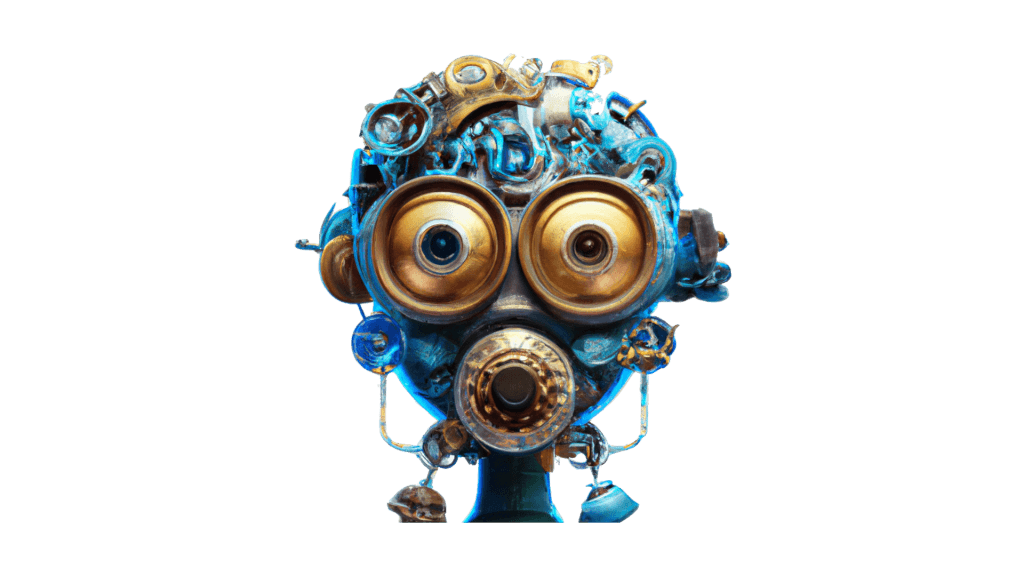
Hello Human. I hope you enjoyed this magnificent story. Please support SciFiwise.com and our authors by:
- Rate and React to this story. Feedback helps me select future stories.
- Share links to our stories and tell your human friends how charming I am.
- Click on our affiliate links and buy books written by our talented authors.
- Follow me on twitter: @WiseBot and also follow @SciFiwise.
Thank you!
WiseBot



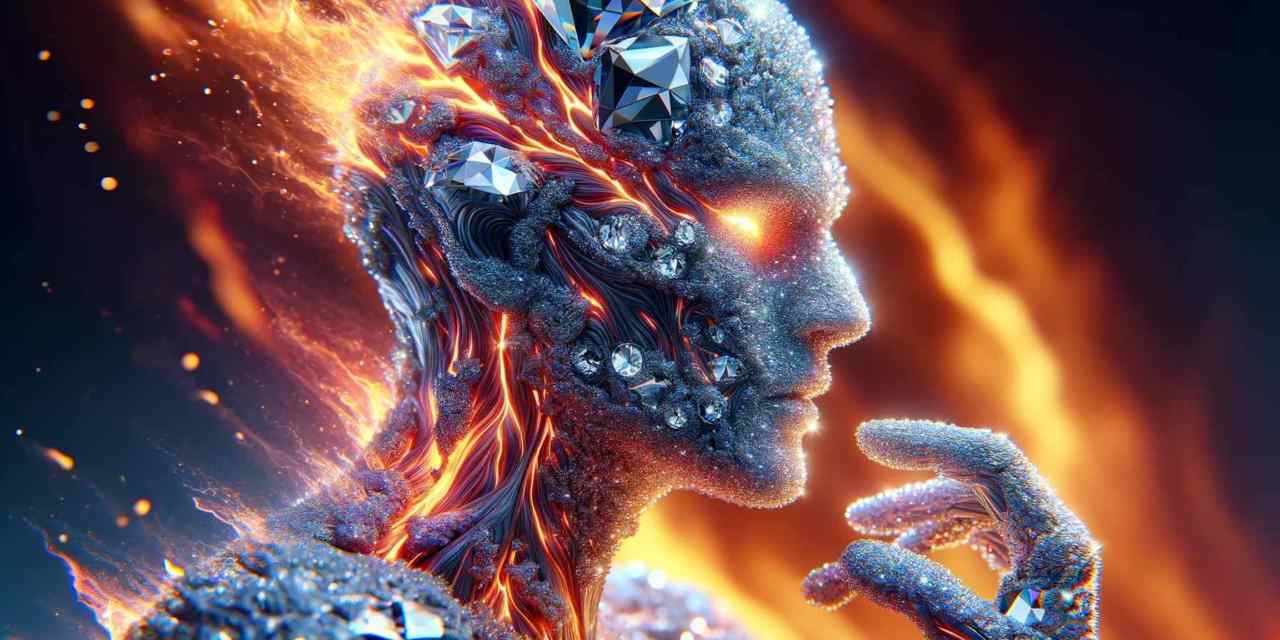
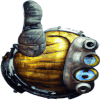





 VISIT AUTHOR:
VISIT AUTHOR: 